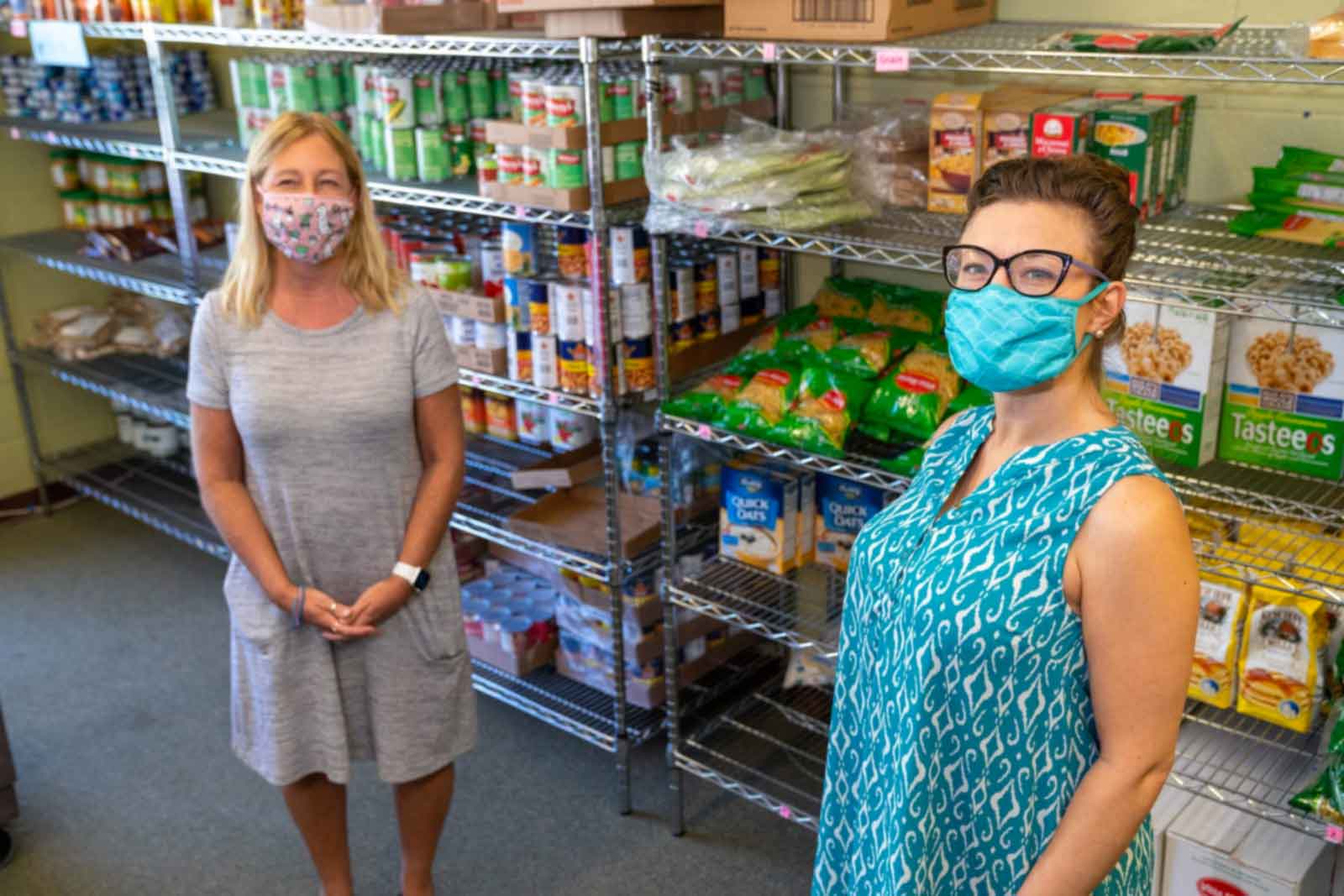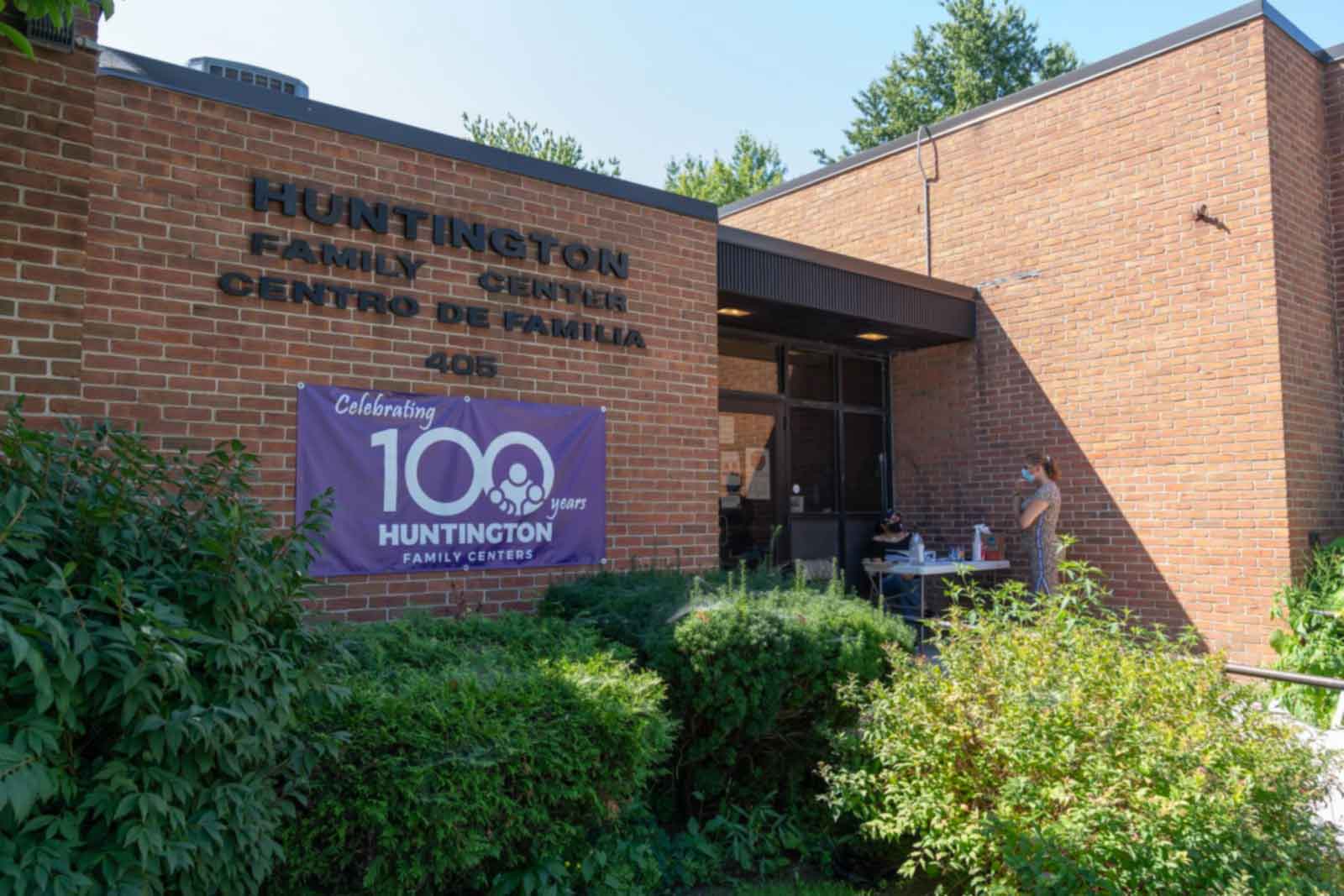
A little charity goes a long way during a crisis.
When the coronavirus pandemic hit last spring, Charity Purchas ’13, G’19 lived up to her name and sprang into action to help her community. Purchas, the emergency services coordinator at Huntington Family Centers, was instrumental in keeping Huntington’s food and diaper pantry running throughout the worst of the crisis in New York state.
“Keeping everything going has been a little bit difficult during the whole COVID-19 crisis,” she says. “Emergency services had to overcome big obstacles so we could still be here for our community.”
Huntington Family Centers was founded as a settlement house in May 1919. Located on Syracuse’s West Side, it provides free year-round programming to help individuals and families develop and grow, including services for youth, families and seniors.
As emergency services coordinator, Purchas manages the food pantry and diaper distribution and organizes donation drives for hygiene and household items. Now, perhaps more than ever, the community really relies on these services. Purchas, who also served nearly two years in the Army National Guard, started working at Huntington Family Centers as an intern more than two years ago while she was in graduate school at the School of Social Work in Syracuse University’s Falk College. Since then, she has joined the staff and embraces her new role in the organization.
Although the situation was challenging, Purchas says the team pulled together more than ever to get the job done. Often there were lines of people wrapped around the block waiting for the food pantry to open. “It took a lot of collaboration and working together just trying to get people to social distance. We had to immediately implement a no-contact service policy,” explains Purchas, noting that it was team effort including Amy Crawford, Huntington’s program director.
The panic buying of items such as toilet paper and hygiene products affected Huntington Family Centers just as it did retail stores. “It was even more important for us to do whatever we could to locate these items so we could offer them to the people in this community, especially our refugee population.”
’Cuse Conversations Podcast
Despite the challenges, Purchas was willing to put in the hard work to get the job done. “I love what I do. No matter what, I enjoy it.” That’s a sentiment echoed by her mentor and boss, Mary Lou Sayles G’93, executive director of Huntington Family Centers. “Charity is amazing. She’s a rock star,” says Sayles.
When Purchas first started her internship at Huntington as a full-time social work student, she put in 20 hours a week while also working full time at night for the Department of Public Safety. Initially, her goal was to one day attend law school, but midway through her internship she knew she loved what she was doing and decided to pursue social work as a career rather than law. Sayles eventually created the role Purchas is in now.
“My intention initially was for Charity to be employed and get experience to move forward, but her job here has morphed into something bigger because she’s great at what she does,” says Sayles.

Working Together to Help the Community
To deal with demand and minimize the wait time for those in need, Purchas, Sayles and the rest of team at Huntington created a pre-order system so people could call ahead to order food and other items, then pick them up at a specific time. They also kept later hours than normal for the food and diaper pantry. “We would have people still waiting around the block at 12 o’clock, which is when we usually stopped serving, and we would still say we’re not going to turn these people away,” says Purchas.
During the height of the pandemic in the local area, they allowed people to come back as much as needed rather than once every 30 days, as is normal policy. “We felt that if they couldn’t get resources somewhere else, then we were going to provide them,” Purchas says. “We didn’t turn anybody away.” Sayles often assisted Purchas with running the food pantry. “I did not want to have direct staff working if I wasn’t working while this virus was out there,” Sayles explains.
Huntington’s other programs have continued to operate remotely. The Pre-K teacher created a website for virtual instruction and offered one-on-one private tutoring, and the after-school program designed its own Facebook page with an activity where kids could get points for “attending.”
“It was hard and still is hard,” says Sayles. “In the beginning it felt like the information we were receiving about the virus was changing daily.” The administration met frequently to devise weekly plans for their services, but many times would have to revise those plans the next day due to changes in the information that was coming in. “It was and continues to be important to be creative and flexible to meet the needs of the neighborhood.”
A Successful Partnership with Falk College
Sayles has been working with interns from the School of Social Work since she started at Huntington Family Centers in 2012, but the school has been in partnership with Huntington for nearly 60 years. Sayles usually personally takes on two interns from Falk College each year, while the larger organization takes on an additional four to six interns per year. “I am always impressed with them,” says Sayles. “A number of them have either taken jobs here or come back here after working elsewhere.”
As a mentor, Sayles is adamant that students make their internship experience their own. “I tell them what I expect them to do and what I will do for them, but it’s their internship. They tell me which projects they want to work on. At Huntington Family Centers I believe they have the ability to be part of many opportunities that they may not have at other agencies.”
When selecting interns, Sayles works closely with Tracy Walker, board president and director of field placement for the School of Social Work.
“Strong agency partnerships with organizations like with Huntington Family Centers are crucial to the success of our social work field program,” says Walker. “It is also very powerful for students to experience an internship in an organization that is led by Mary Lou, one of our social work alumni, and to work alongside staff like Charity. As role models go, you can’t get any better!”
Even as the pandemic surged, Sayles and Walker were still committed to placing interns this academic year. “We treat our interns as if they are our employees—they get the same consideration and respect. If we were continuing to bring programs to the building during this uncertain time, then we were going to keep our commitment to placing interns.”
Purchas and the rest of the staff at Huntington Family Centers are still working hard to do all they can to keep things running smoothly for the community during this time of crisis, and Sayles is standing by their side as a leader in a mission-driven organization. “One hour I’ll be signing checks in the office and the next I’ll be the pantry person. It keeps me informed of what our community needs and what the staff needs to keep safe,” Sayles says.
~ Lisa Maresca
An SU Story published on September 1, 2020.
